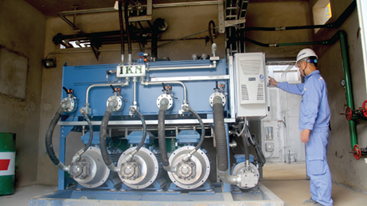Saturday, 27/07/2024 | 07:37 GMT+7
Only the very poorest countries would be eligible to receive funds for building new coal-fired power stations under proposed new rules.
The World Bank is planning to restrict the money it gives to coal -fired power stations, bowing to pressure from green campaigners to radically revise its funding rules.
The new proposals would not mean an end to funding for fossil fuels, but would represent a departure from previous regulations. Under these rules, the bank has provided sizeable financial support for coal-fired power stations in the developing world in spite of protests from governments and green groups.

Under the proposed new rules, only the very poorest countries would be eligible to receive grants or loans for building new coal-fired power stations, and then only if they could prove they were necessary and that alternatives – such as renewable energy – were not feasible.
An entirely new energy strategy is being written by the development bank, in part because of concerns that its current funding practices favour fossil fuel power. The new draft proposals, seen by the Guardian, emphasise the potential of renewable sources of energy.
But the proposals were criticised by campaigners as inadequate. "The draft strategy is disappointing. It looks as though the World Bank is trying to greenwash its activities while by and large continuing with dirty business as usual," said Alison Doig, senior adviser on climate change at the charity Christian Aid. "While it proposes a ban on coal lending to middle-income countries, the bank will continue its fossil fuel investments in the poorest countries, condemning them to a high-carbon future. In real terms, this means that the bank could still end up spending more than ever on fossil fuels, because it intends to keep backing such dirty projects in the poorest countries."
She added: "The draft strategy eloquently describes the plight of the more than 2 billion people who live in energy poverty, cooking on smoky open fires and with no electric lighting and no power for their small businesses. But it is worryingly vague about how it will tackle this and the target is woefully short on ambition - it would reach less than 2% of people who currently do not have electricity in their homes."
The World Bank's record on funding fossil fuels has long been a target of green campaigners. Last year, for instance, the World Bank was attacked for its controversial decision to grant nearly $4bn (£2.5bn) to the South African company Eskom to build what would be one of the world's largest coal-fired power stations.
The bank spent £3.4bn – one-quarter of all its spending on energy projects – on coal-fired power in developing countries in the year to June 2010. That was 40 times more than the sum spent five years previously.
Robert Zoellick, the president of the World Bank, has frequently spoken out in public about the need to realign the institution's funding criteria with its climate change goals. The World Bank is also one of the world's biggest funders of low-carbon energy generation, but critics complain that there has been a lack of a coherent, institution-wide strategy on energy funding to date.
The bank has also been attacked for its attempts to take over the international funding of climate change projects. Under the 2009 Copenhagen accord, the bank could be charged with dispensing the billions of funding that rich countries are due to send to poor countries, in order to help them cope with the effects of climate change and cut greenhouse gas emissions.
Doig said: "The World Bank seems to think it can manage the world's new climate funds while continuing to bankroll high-carbon development. Instead, it should be coming up with a coherent, credible strategy to promote thriving green economies which help developing countries to adopt technologies fit for the 21st century."
The new proposals are likely to take months to be accepted.
Source: guardian.co.uk








.jpg?w=367&h=206&mode=crop) Notice for Contracts award for Support to Industrial Enterprises for Energy Audits and Preparation of Feasibility Studies (Package No. C2.2.4)
04/06/2024
Notice for Contracts award for Support to Industrial Enterprises for Energy Audits and Preparation of Feasibility Studies (Package No. C2.2.4)
04/06/2024
 Training Courses for Energy Managers and Energy Auditors
Training Courses for Energy Managers and Energy Auditors
 Vietnam Energy Outlook Report – Pathway to Net Zero
Vietnam Energy Outlook Report – Pathway to Net Zero
 Long Son Cement saves 30% of electricity consumption thanks to heat recovery
Long Son Cement saves 30% of electricity consumption thanks to heat recovery
 Expression of Interest: C2.1.15: Development of Energy-Efficient Technology Catalogs for the Industrial Sector
Expression of Interest: C2.1.15: Development of Energy-Efficient Technology Catalogs for the Industrial Sector
 Optimizing Compressed Air Systems for Southern Industrial Enterprises
Optimizing Compressed Air Systems for Southern Industrial Enterprises
 The Ministry of Industry and Trade Review the Energy Efficiency and Conservation activities in Lao Cai.
The Ministry of Industry and Trade Review the Energy Efficiency and Conservation activities in Lao Cai.
 EOI Extension: C2.2.2: Review and update for current EE benchmarking for 2 sub-industrial sectors
EOI Extension: C2.2.2: Review and update for current EE benchmarking for 2 sub-industrial sectors